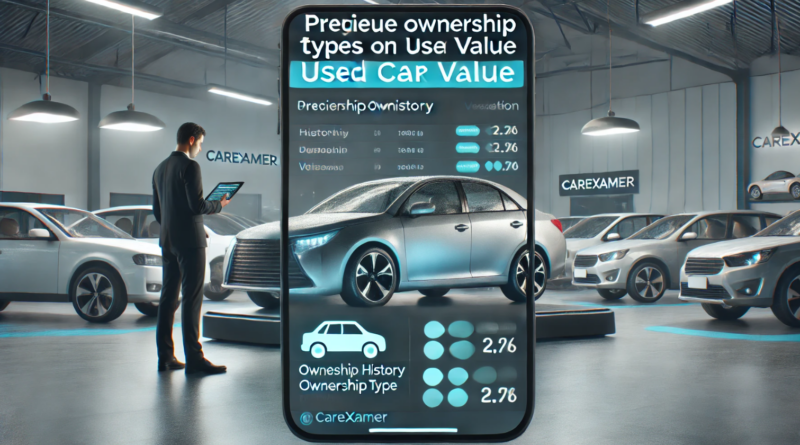The Impact of Previous Ownership Types on Used Car Value
Let’s break it down in a way that makes sense on impact of previous ownership types on used car value. When you’re shopping for a used car, the question of “who owned it before?” can be just as important as “what kind of car is it?” A car’s previous ownership type tells you a lot about how it was driven, maintained, and whether it’s likely to give you smooth rides—or headaches—in the future. Always check what you are buying as it’s used car and conditions vary significantly car by car bases
Why Previous Ownership Matters
Think of a car like a pair of shoes. A pair worn daily by a marathon runner will show different wear than one only used for occasional strolls. The same goes for cars. How a car was used—and cared for—affects its condition, reliability, and even how much you’ll need to spend on maintenance down the line.
Knowing the ownership history isn’t just about curiosity—it’s about making sure you’re getting what you’re paying for.
The Different Types of Previous Ownership
1. Fleet or Rental Cars
These are cars that belonged to businesses or rental agencies, and they’re built to handle a lot of use.
What to Expect:
- High Mileage: These cars clock a lot of highway miles, which isn’t as hard on the engine as city driving.
- Regular Maintenance: Rental companies and fleets are strict about keeping up with maintenance to avoid breakdowns.
- Basic Features: Don’t expect fancy upgrades—these cars are usually the standard version of the model.
Is It a Good Buy?
If you’re on a tight budget, fleet or rental cars are a solid option. Yes, they’ll have high mileage, but the regular maintenance can make up for it. Just be sure to double-check the condition to avoid any surprises.
2. Lease Returns
Leased vehicles are essentially “borrowed” by individuals or companies for a set period, often 2-4 years. When the lease ends, the cars go back to the dealership.
What to Expect:
- Lower Mileage: Leases often come with mileage caps, so these cars typically have less wear.
- Great Maintenance: Lease agreements usually require the driver to keep up with servicing, or they face penalties.
- Good Condition: Leaseholders want to avoid fees for damages, so these cars are usually well cared for.
Is It a Good Buy?
Absolutely. Lease returns are like the Goldilocks of used cars—not too old, not too worn, and often in excellent shape. They might cost more than rental cars, but you’re getting a lot of value for the price.
3. Privately Owned Cars
These are cars owned by regular folks like you and me. They’re used for personal errands, commutes, and the occasional road trip.
What to Expect:
- Varied Maintenance: Some private owners are meticulous, keeping every service record and washing their car weekly. Others… not so much.
- Mileage Can Vary: Depending on the owner’s lifestyle, the car might have low mileage or have been driven into the ground.
- Possible Customizations: Private owners sometimes modify their cars. Think new rims, upgraded sound systems, or a turbocharger. These can be a pro or a con, depending on what you want.
Is It a Good Buy?
It depends! A well-maintained car from a careful owner can be a fantastic find. But if the car has been neglected—or heavily modified—it could end up being more trouble than it’s worth.
How to Check Ownership History
So, how do you figure out who owned the car and how it was treated? Here’s what to do:
- Get a Vehicle History Report: Use services like Carfax or AutoCheck to see previous owners, accidents, and mileage.
- Check Service Records: A well-maintained car will have a paper trail of oil changes, brake replacements, and other services.
- Inspect the Car: Look for signs of wear that match its usage. For example, heavy interior wear in a rental or mismatched parts in a modified car.
- Ask Questions: Whether you’re buying from a dealer or a private seller, don’t be shy about asking how the car was used.
Making the Right Choice for You
Every type of ownership has its pros and cons. Here’s a quick cheat sheet to help you decide:
- Fleet or Rental Cars: Great if you’re looking for affordability and reliability over luxury.
- Lease Returns: A perfect choice for buyers who want a newer car in excellent condition without paying the new-car price.
- Private Ownership: Ideal if you find a well-cared-for car, but requires extra attention to details like maintenance history and condition.
The Bottom Line
A car’s history is its story, and understanding that story helps you make smarter decisions. Whether it spent years cruising highways as a rental, was pampered as a lease, or had adventures with a private owner, knowing its past gives you the confidence to say, “Yes, this is the car for me.”
So the next time you’re car shopping, don’t just look at the make, model, and mileage—ask about its life before you. It might just steer you toward the perfect ride.
Buying a used VW. Buying used vauxhall, BMW, Jaguar, Ford, Volvo, Range rover, Bentley, Aston Martin, Porsche, Ferrari, Lamborghini, Maserati, Hyundai, Tesla, Honda, Pagani

